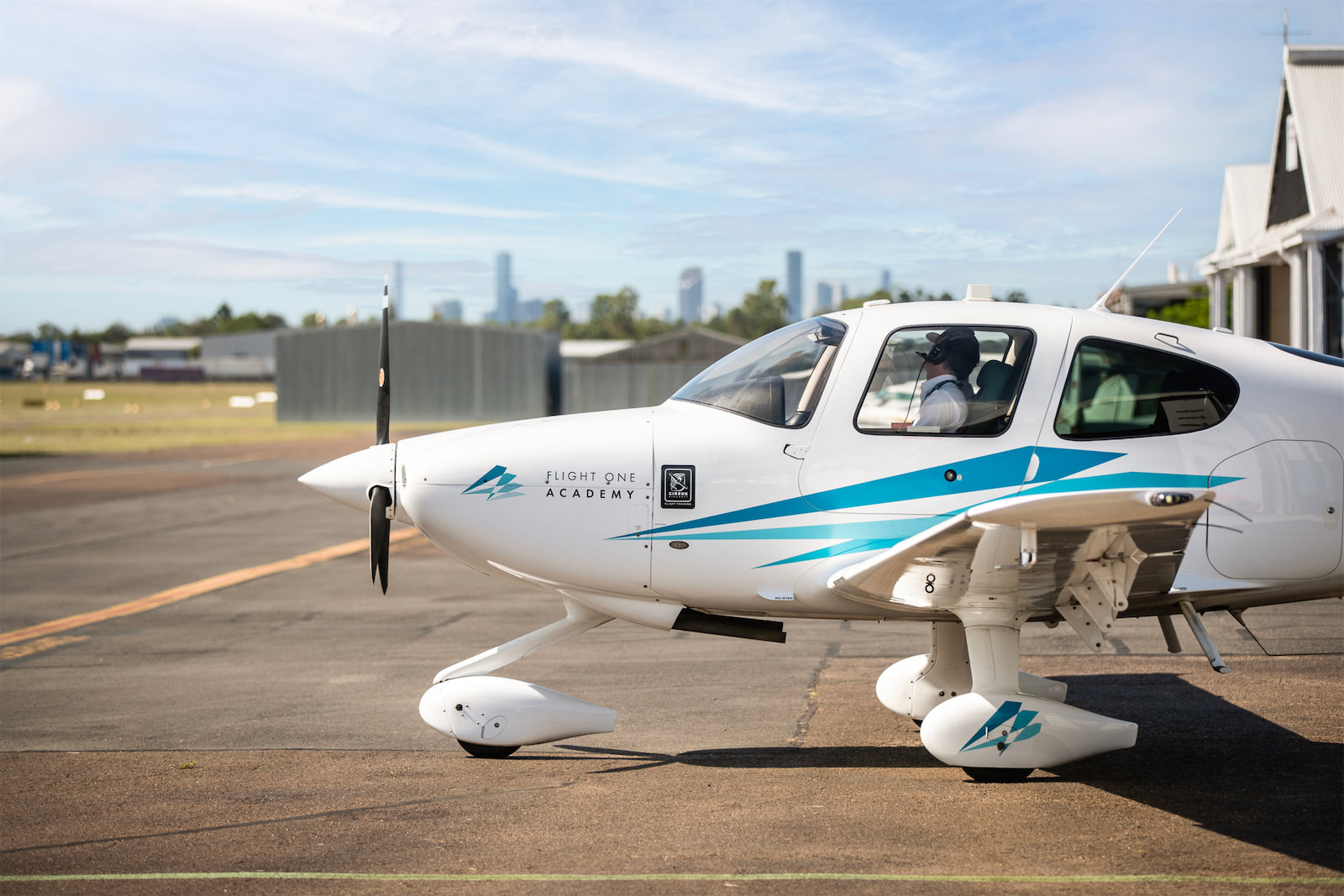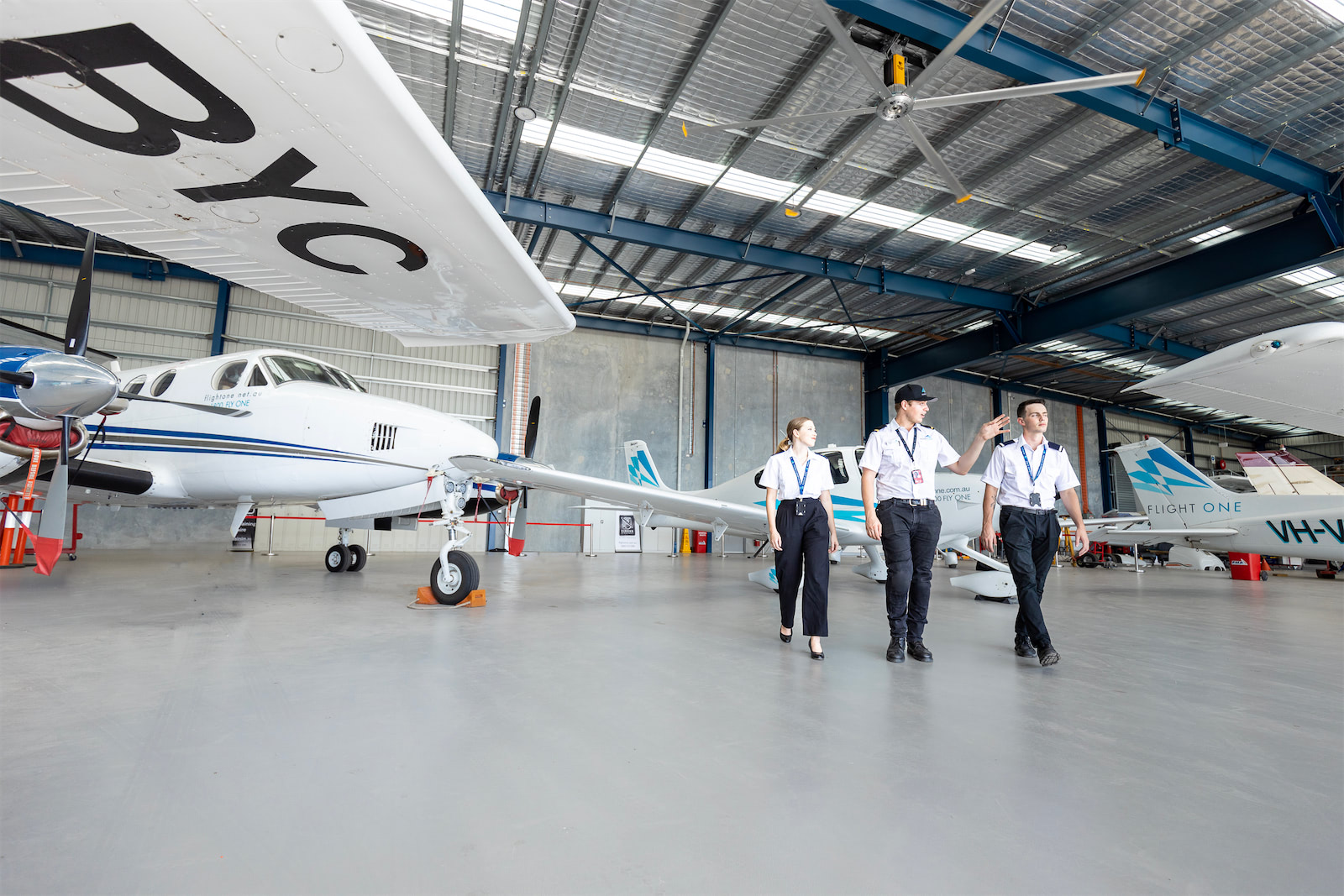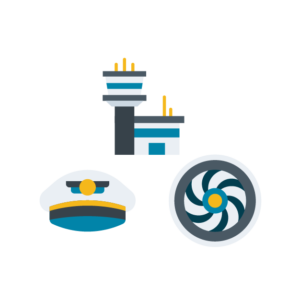Course Details
| Qualification |
MEA40618 Certificate IV in Aeroskills (Avionics) |
| Training Provider |
Flight One Academy (RTO 45165) |
| Training Location |
Archerfield Airport, Brisbane |
Flight One Academy has the privilege of being a CASA certified Maintenance Training Organisation. (Certification number CASA.147 MTO.0048.) This industry certification allows us to deliver theory and practical training and assessments toward the Australian Aircraft Engineer Licence. As part of the Tisdall Aviation Group, Flight One Academy has a unique capacity to provide students with the opportunity to undertake all the required practical learning, integrated right into the course, providing opportunities to complete the qualification prior to entering the industry.
Theory and hand-skill training is conducted primarily in a classroom environment co-located with our Archerfield Airport aeroskills workshop. To address the practical requirements of the qualification, students will receive the opportunity to undertake practice-based activities recorded in a Log of Industrial Experience and Achievement. Students may complete their logged practical training during the course or alternatively, in an aviation workplace.
Flight One Academy’s Cert IV programmes are designed to provide foundational learning across a range of aircraft maintenance concepts and prepare graduates to directly enter the industry as an Aircraft Engineer (unlicenced).
Students will learn how to supervise maintenance activities, remove and install advanced aircraft components, and learn how to troubleshoot a wide range of complex aircraft systems.
Leveraging the wider Tisdall Aviation Group’s MRO facilities, we have designed the course to provide students with the opportunity to benefit from engagement with our in-house live aircraft maintenance environment, providing every trainee the best possible learning experience.
Outcomes
The course includes formal aeroskills theory training aligned to the knowledge requirements within the Civil Aviation Safety Regulations Part 66 Modules, and assessments that are delivered under our CASA Part 147 Maintenance Training Organisation Approval Certificate (CASA.147 MTO.0048). When combined with our extensive practical training, this structure empowers our graduates and prepares them to seize career opportunities as they arise.
To be eligible to apply for a CASA Aircraft Engineer Licence, graduates must undertake a further Diploma Year and also meet CASA’s stipulated employment experience requirements but will not need to undertake further training or assessments.
The expected outcomes of this course, subject to demonstrated competencies, are:
- MEA40618 Certificate IV in Aeroskills (Avionics)
- Log of Industrial Experience and Achievement
Training & Assessment Arrangements
Training is conducted at Archerfield Airport in Brisbane, Australia, via face to face classroom learning by experienced aviation trainers utilising authentic aircraft engineer training equipment, tools and aircraft components to supplement the quality theory training.
Assessments for this programme are conducted and invigilated in accordance with the requirements of the Civil Aviation Safety Authority (CASA) and the Australian Skills Quality Authority (ASQA). Assessments may include, but are not limited to, multiple choice, short answer, short essays, group work under observation and practical aviation assessments.
Recognition For Prior Learning (RPL)
Applicants with well documented previous training and/or experience may be eligible for Recognition for Prior Learning toward Units of Competency included in this qualification. Please advise at the time of application if you are seeking RPL.
Delivery Mode
The course is delivered face to face on campus, supported by online learning facilities. The course runs 4 to 5 days per week during term and attendance is compulsory unless otherwise approved by the Head of School. Students undertaking this course are expected to wear the college uniform provided.
Double Cert IV
Flight One Academy offers engineer students the option of simultaneously undertaking both the Avionics and Mechanical streams through our unique Double Certificate IV in Aeroskills which comprehensively delivers all theory training for the both the mechanical and the avionics streams.
The Double Cert IV programme involves a challenging workload, so trainees will need to demonstrate perseverance and diligence. The rewards however are significant, as the extended qualification equates to greater employability.
Certificate vs Diploma
Flight One Academy has designed its Aeroskills Diploma programme to be undertaken as a combined qualification, because all the units contained within the Certificate IV are part of the Diploma. The Certificate IV leads directly to employment as a qualified Aircraft Engineer.
The Diploma, by incorporating CASA regulated training and assessments, fully prepares you to be eligible to obtain an Aircraft Engineer Licence once you have met CASA’s stipulated periods of employment.
In undertaking the combined programme, you will graduate with both a Certificate IV and a Diploma of Aeroskills, with either or both of your chosen specialisations. For diploma graduates, no further basic training or assessments required!
Domestic Student Tuition Fees
Single Certificate IV in Aeroskills (Avionics) Tuition Fee Information. All amounts are in Australian Dollars.
- Delivery in Queensland: This course is delivered in Queensland in-class on a full-time basis over 12 months and receives a significant industry supported discount. The total for this qualification you will need to pay in Queensland is $14,400.
- Delivery in South Australia: Flight One Academy is a South Australian Government approved Subsidised Training Provider. This course is subsidised and is currently available in South Australia through apprenticeships / traineeships only. Skilling South Australia is a South Australian government initiative helping people get skills and qualifications to build careers and meet the workforce needs of industry. Please contact us for full details.
VET Student Loan is not available for Certificate IV programmes.
Payment Plan
A Payment Plan is available for this course that allows tuition fees to be paid in scheduled instalments as follows (Queensland delivery only):
| Month 1 |
$1,340.00 |
| Month 2 |
$1,300.00 |
| Month 3 |
$1,300.00 |
| Month 4 |
$1,300.00 |
| Month 5 |
$1,300.00 |
| Month 6 |
$1,300.00 |
| Month 7 |
$1,100.00 |
| Month 8 |
$1,100.00 |
| Month 9 |
$1,090.00 |
| Month 10 |
$1,090.00 |
| Month 11 |
$1,090.00 |
| Month 12 |
$1,090.00 |
| TOTAL |
$14,400.00 |
Other Fees
There are no other fees associated with this diploma.
Units of Competency
ASQA Units of Competency that may be used in the delivery of the course include:
Common Core Units (required for both Avionics and Mechanical streams)
MSMENV272 Implement and monitor environmentally sustainable work practices
MEA154 Apply work health and safety practices in aviation maintenance
MEA155 Plan and organise aviation maintenance work activities
MEA156 Apply quality standards during aviation maintenance activities
MEA107 Interpret and use aviation maintenance industry manuals and specifications
MEA157 Complete aviation maintenance industry documentation
MEA158 Perform basic hand skills, standard trade practices and fundamentals in aviation maintenance
MEA118 Conduct self in the aviation maintenance environment
MEA148 Apply mathematics and physics in aviation maintenance
MEA201 Remove and install miscellaneous aircraft electrical hardware/components
MEA246 Fabricate and/or repair aircraft electrical hardware or parts
MEA296 Use electrical test equipment in aviation maintenance activities
MEA301 Perform aircraft flight servicing
AVIF0044 Marshal aircraft
Avionics Stream Units
MEA261 Use electronic test equipment
MEA202 Remove and install basic aircraft electrical system components
MEA204 Remove and install basic aircraft instrument system components
MEA206 Remove and install aircraft basic radio communication and navigation system components
MEA293 Remove and install aircraft electronic system components
MEA226 Inspect aircraft electronic systems and components
MEA229 Test and troubleshoot aircraft radio frequency navigation and communications systems and components
MEA208 Remove and install aircraft pressurisation control system components
MEA209 Remove and install aircraft oxygen system components
MEA225 Inspect fixed wing aircraft automatic flight control systems and components
MEA231 Inspect, test and troubleshoot rotary wing aircraft automatic flight control systems and components
MEA232 Test and troubleshoot aircraft pulse systems and components
MEA280 Inspect, test and troubleshoot flight management systems and components
MEA279 Inspect, test and troubleshoot full authority digital engine control systems
Note: Provided as a guide only. Actual units delivered at the discretion of the Head of School. Prerequisites may apply to some units.
Academic Criteria
- Australian Year 12 (Senior High School) Certificate of Education; or
- International Baccalaureate Diploma Programme (IB) diploma; or
- successful completion of an Australian Qualifications Framework certificate IV or higher qualification (where the language of instruction is English), or at a level in a framework that preceded the AQF that is equivalent to level 4 or above in the AQF or; that has been assessed by a Federal, State or Territory government agency which assesses overseas qualifications (or an organisation contracted by such an agency to undertake such assessments) as equivalent or comparable to a qualification referred to in the VET Student Loans Rules; and the course for the qualification was delivered in English.
- If you cannot provide the above documents, you will be required to display competence at Exit Level 3 in the Australian Core Skills Framework in both reading and numeracy. We will assess your competence using the Australian Government approved assessment tool — LLN Robot, or other approved tool of our choice.
English language Criteria
All applicants, unless exempt, must present an IELTS Certificate (Academic Module) no more than 1 year old.
For direct entry, the IELTS result must be at least 6.0 overall with no band score below 5.5. English pathway options are available for applicants who have not attained this minimum level.
Please note: You may be exempt from the English language entry criteria if you are a citizen of Australia, or studied for the last 2 years in Australia, New Zealand, United Kingdom, Republic of Ireland, Canada or the United States of America enrolled in a formal qualification. Exemptions are assessed case by case. The Australian Civil Aviation Safety Authority (CASA) requires that individuals from non-English speaking backgrounds seeking an Australian Aircraft Maintenance Engineer Licence must present an IELTS score of 6.0 with no band score below 6.0 prior to being issued a licence.
English language packaged pathways are available for this course but a formal test result may still be required.
CASA English Language Criteria
Aircraft maintenance trainees should also be aware that, according to CASR Part 66 AMC CASR 66.025 /GM CASR 66.025, all personnel wishing to hold an Aircraft Maintenance Engineer Licence will be required to provide evidence to the Civil Aviation Safety Authority that they have achieved a suitable English language proficiency level.
An applicant for a maintenance certification licence must be able to read, write and converse in English to a level that CASA is satisfied is sufficient to enable the applicant to safely exercise the privileges of the licence applied for. The level of knowledge would be such that the licence holder is able to:
- read and understand the instructions and technical manuals in use within the organisation;
- make written technical entries and any maintenance documentation entries, which can be understood by those with whom they are normally required to communicate;
- read and understand the maintenance organisation procedures; and
- communicate at such a level as to prevent any misunderstanding when exercising certification privileges.
Approved English language evidence that may be required for Non English Speaking Background (NESB) engineers:
- International English Language Testing System with an overall grade of six on condition no single test area has a score of less than six on either the academic or general training module;
- Test of English as a Foreign Language Internet Based Test (TOEFL iBT) score of 78;
- Test of English as a Foreign Language Paper Based (TOEFL PB) score of 547; and
- Test of English for International Communication Secure Program (TOEIC Secure Program/Public Testing Centre) score of Listening 350; Reading 330; Speaking 160 and Writing 160.







